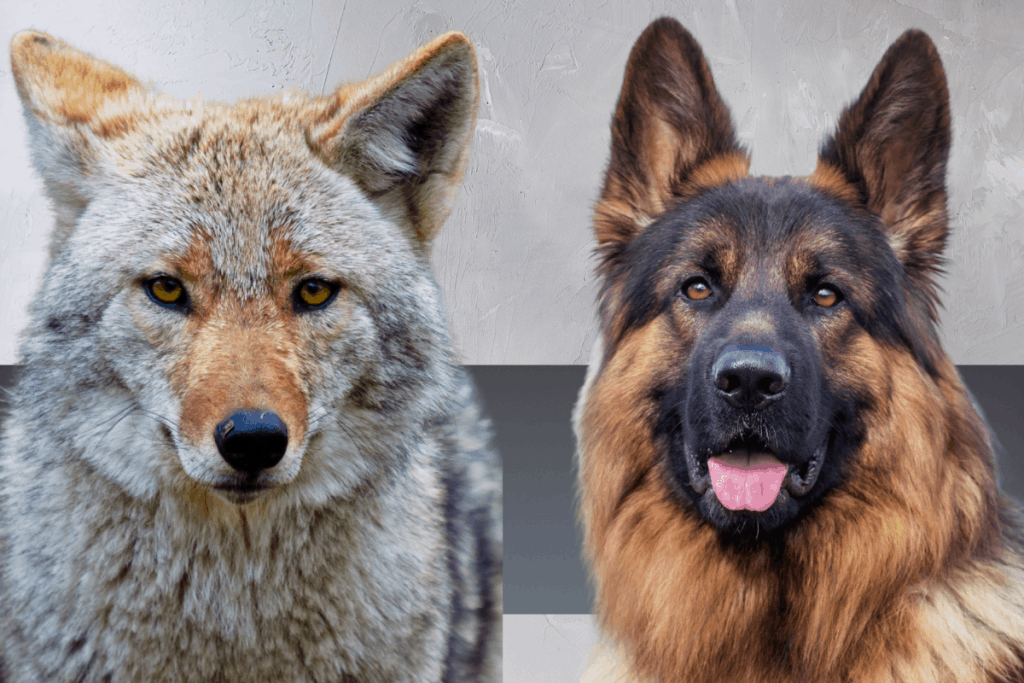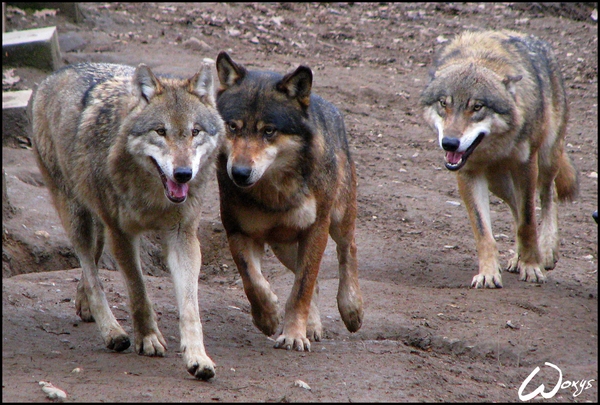
Have you at any point pondered and thought, 'would a German shepherd be able to kill a wolf?' Or is it even feasible for this to occur?
Albeit German Shepherds are exceptionally solid, they can't kill a wolf in a battle, and they would almost certainly support genuine wounds or get killed should a wolf assault.
The motivation behind why wolves are greater and more grounded than canines has been detailed exhaustively here!
Could A German Shepherd Kill A Wolf?
No, a German Shepherd can't kill a wolf. Wolves are a lot bigger than German Shepherds and have more keen teeth to tear open their prey's toughness.

German Shepherds are not the proper kind of canine to go into a battle with. These canines are strong, yet they seldom take on creatures that would place them in danger. All things being equal, they make magnificent family pets and hunting accomplices for their speed and deftness.
To find out about why a German shepherd can not kill a wolf, we should analyze them.
German Shepherd vs. Wolf
Size
A German shepherd might look huge to the unaided eye, and many might think they are basically as large as a wolf.
Notwithstanding, a German shepherd is a lot more modest than a wolf in tallness and length, with grown-up guys arriving at 65 cm or 25 crawls at the shoulder. As far as size, German shepherds are significantly more like coyotes, which might conceivably develop to be 25 inches tall at the shoulder.
Wolves, then again, can develop to be 35 inches tall at the shoulder.
A distinction of 10 crawls at the shoulder is tremendous; 2 creeps at the shoulder is significant and perceptible. The size distinction between a wolf and a German shepherd would be surprising assuming you saw them next to each other.
There are not really a couple of canines that are just about as tall as wolves. Extraordinary Danes, Irish wolfhounds, and perhaps Kangals and menace kuttas are near a wolf regarding size.
Assuming you've at any point seen an incredibly tall wolfhound or Great Dane with different canines, you've likely seen how absurdly tall they are; a wolf is similarly as tall.
Shockingly, they don't gauge so much. Albeit a few reports more than 200 pounds have been made, these poor person been checked. The heaviest void stomach wolf dependably detailed from populaces of the most conspicuous wolf subspecies (lupus occidentalis) is around 145 pounds.
There were approximately eight wolves that weighed in excess of 140 pounds after a large number of mature wolves were estimated. Most are around 100-110 pounds, yet they're as yet gigantic grown-up male wolves (those in the above pictures are reasonable no bigger than 115 lbs).

German shepherds can weigh between 100 and 110 pounds, with most weighing between 75 and 90 pounds, yet even a massive 110-pound German shepherd would not appear to be as large as a wolf.
Other dogs that are the same height as the wolves and appear to be the same size are significantly heavier.
The majority of Irish wolfhounds weigh between 160 and 180 pounds, while most Great Danes weigh between 175 and 200 pounds (and Kangals and central Asian ovcharkas and bully kuttas are sometimes over 200 lbs).
Speed
A mature German shepherd can reach a speed of around 30-34 miles per hour (48 – 54 km per hour), while wolves like timber wolves, arctic wolves, and red wolves can run at a speed of around 38 – 45 miles per hour (56- 72 km per hour).
Territorial nature
Wolves are territorial, establishing territories far larger than they require to ensure a constant supply of prey. The amount of prey available and the age of the pack’s pups determine the size of the territory.
Wolves often fight for territory, and it is the main cause of the fight among wolves.
When the pups reach the age of six months and have the same dietary needs as adults, they tend to grow in size in locations with low prey concentrations.
Wolf packs are continuously on the move to pursue prey, covering around 9% of their territory each day at a speed of 25 km/h (16 mi/h). They spend 50% of their time in the center of their region, which is on average 35 km2 (14 sq mi).

German shepherds are also very territorial, but their territory is the amount of space the owner has as they are pets.
The less your dog is exposed to the outside world and the more secluded and confined its ” territory,” the more protective of its territory it will be.
Bite force
The bite force of an ordinary dog is 230-250 psi, which is twice that of a human. Dogs with larger jaws, on the other hand, will have stronger bites than an ordinary dogs.
The German Shepherd is one of the most powerful canines, with an average biting force of 238 pounds per square inch.
Wolves are far more powerful, with bite forces ranging from 400 to 1,200 pounds per square inch, depending on whether the wolf is defending itself orbiting for another cause.

Are German Shepherds Considered Wolf Breeds?
The German Shepherd is a domesticated large working dog breed, originally bred for herding and guarding livestock. The modern-day German Shepherd is known as the world’s most popular dog breed and the most popular breed in Canada, the United States, and Germany.
German Shepherds are not considered wolf breeds but rather descendants from gray wolves. This means that they can’t kill large prey like a wolf because of their size and lack of hunting skills.
They have some distinct characteristics that make them different than other dogs. These include their thick coat of fur, strong body structure, and the way they act around humans.
What Kind Of Dogs Could Kill A Wolf?
Unless the dog has a significant size advantage, there seem to be no dogs that could kill a wolf. Wolves appear to be stronger and faster (in response time, that is—they cannot outrun greyhounds) than any domestic dog, pound for pound.

Even though the average Rottweiler is much larger than the average wolf, their bite is significantly more powerful than that of a Rottweiler, often the strongest dog.
And a Pitbull is a powerful dog for its size, but it’s not a particularly large dog, weighing in at roughly 60 pounds for males vs. 80 pounds for the average male wolf (though it varies greatly by population, with some populations rarely above 40 lbs and others in rare cases reaching as much as 120 lbs. or more).
Conclusion
German shepherds are extremely smart and loyal dogs, but they will not win a fight against a wolf. They are naturally protective of their owners and other family members, so don’t be surprised if your dog tries to attack a wolf.




0 Comments
Your Comment Means A Lot!!